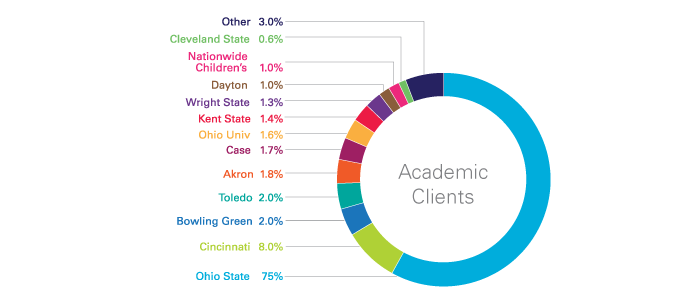This snapshot view illustrates the Center’s 2013-14 system usage by academic institution
Supercomputers are powerful, yes. But they are only as powerful as the codes researchers write for them. Brian Guilfoos, HPC client services manager at the Ohio Supercomputer Center, understands that high performance computing isn’t always intuitive and that education and training are essential services.
User Training
Faculty, staff and students can take advantage of everything from reference material on our website to web-based portals to in-person training. Workshop topics range from the very, very basic such as what OSC is, services provided and how to get an account, to more specific issues such as batch systems, scheduling or how to construct a job. We’re also exploring asynchronous video training for people who are visual learners.
XSEDE (the Extreme Science and Engineering Discovery Environment) frequently partners with OSC, providing additional training opportunities. With XSEDE, a lecture happens in one location and is streamed to multiple sites, including OSC, with local teaching assistants.
Support Services
OSC Help, which is staffed by the client services group, provides technical support and consulting. Researchers can contact us by phone or email during business hours, Monday through Friday.
Additionally, we look for proactive opportunities to assist our researchers. For example, the systems staff may notice a particular problem through their automated monitoring. If someone’s code is not properly parallelized, it might cause all its threads to run on one host instead of across all the hosts in the job, which slows down the compute time. When we find those issues, we’ll provide some guidance and assistance to adjust the code, so it runs more efficiently.
Staff Expertise
We’re fortunate to have a number of staff with specialized domain knowledge. We have strengths in biological sciences and computational fluid dynamics. For issues such as finite element analysis, we also can engage subject matter experts in other departments. For the past two years, we’ve worked with University of Cincinnati IT to provide training opportunities for their research community. UC provides onsite logistics, and we provide the hands-on workshops. We want to collaborate more like this, to find people around the state who aren’t OSC users but could benefit by using our services.
Computational Science
OSC’s education programs, led by Steve Gordon, senior education specialist, create a pipeline to build and sustain a computational science workforce, from middle and high school students, to internships to undergraduate education and in-career certification programs.
Ralph Regula School of Computational Science. This virtual collaboration offers students a program that leads to a baccalaureate minor or associate degree; the stackable workforce certification program provides workers with an opportunity to learn computer modeling and the underlying math and computer programming skills.
Student Internships. More than 30 undergraduate and graduate students gain real-world experience through a variety of internships at OSC and its partner organizations in the Ohio Technology Consortium.
Summer Programs. OSC’s Summer Institute exposes Ohio’s high school students to high performance computing and networking during the two-week residential camp. Likewise, the Young Women’s Summer Institute helps middle-school girls develop an interest in computers, math, science and engineering.

